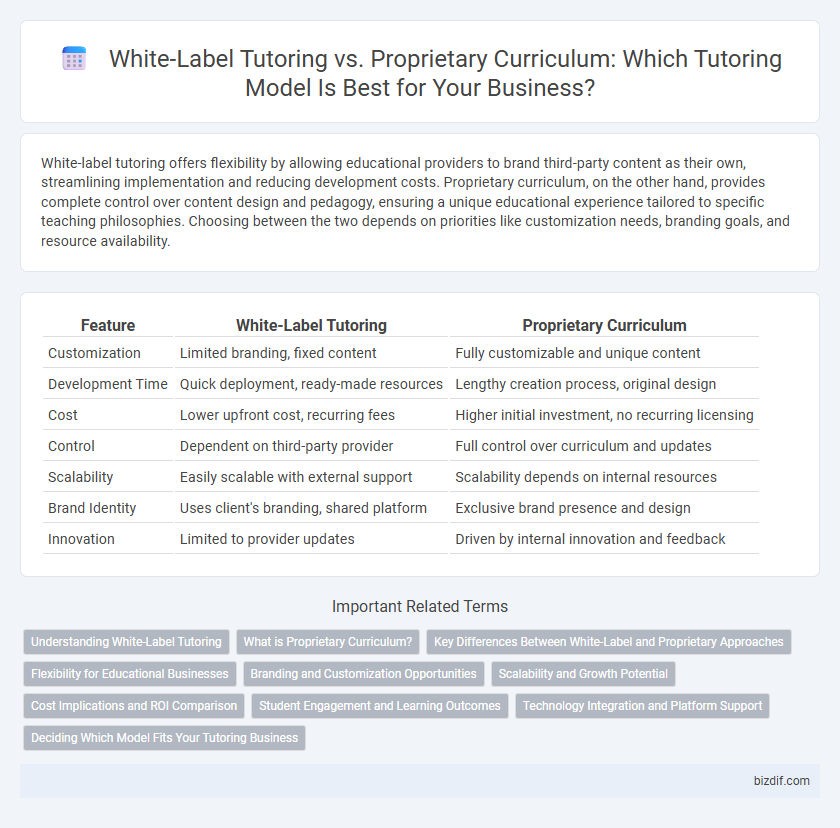White-label tutoring offers flexibility by allowing educational providers to brand third-party content as their own, streamlining implementation and reducing development costs. Proprietary curriculum, on the other hand, provides complete control over content design and pedagogy, ensuring a unique educational experience tailored to specific teaching philosophies. Choosing between the two depends on priorities like customization needs, branding goals, and resource availability.
Table of Comparison
| Feature | White-Label Tutoring | Proprietary Curriculum |
|---|---|---|
| Customization | Limited branding, fixed content | Fully customizable and unique content |
| Development Time | Quick deployment, ready-made resources | Lengthy creation process, original design |
| Cost | Lower upfront cost, recurring fees | Higher initial investment, no recurring licensing |
| Control | Dependent on third-party provider | Full control over curriculum and updates |
| Scalability | Easily scalable with external support | Scalability depends on internal resources |
| Brand Identity | Uses client's branding, shared platform | Exclusive brand presence and design |
| Innovation | Limited to provider updates | Driven by internal innovation and feedback |
Understanding White-Label Tutoring
White-label tutoring offers educational institutions the ability to provide personalized tutoring services under their own brand without developing a proprietary curriculum, enabling rapid scaling and consistent quality. This approach leverages third-party content and platforms, ensuring cost-efficiency and access to proven educational methodologies. Understanding white-label tutoring helps schools balance brand control with operational flexibility while meeting diverse student needs effectively.
What is Proprietary Curriculum?
Proprietary curriculum is an exclusive educational content developed and owned by a specific tutoring company, designed to align with their teaching methods and learning objectives. This curriculum often includes customized lesson plans, assessments, and instructional materials that differentiate the tutoring service from competitors. Proprietary curriculum aims to enhance student outcomes by providing a consistent and unique learning experience tailored to the company's educational philosophy.
Key Differences Between White-Label and Proprietary Approaches
White-label tutoring offers customizable branding and flexible content integration, enabling educators to deliver personalized learning experiences using pre-designed frameworks. Proprietary curriculum involves exclusive, in-house content development ensuring unique pedagogical strategies and maintaining full control over instructional quality. Key differences lie in ownership rights, content adaptability, and potential scalability, with white-label focusing on brand consistency and proprietary emphasizing educational originality.
Flexibility for Educational Businesses
White-label tutoring offers educational businesses greater flexibility by allowing customization of branding and teaching methods, facilitating seamless integration with existing services. Proprietary curriculum, while providing a structured and tested framework, often limits adaptability to specific market needs and unique student requirements. Choosing white-label solutions enables businesses to tailor offerings and respond quickly to evolving educational trends and client demands.
Branding and Customization Opportunities
White-label tutoring platforms offer extensive branding opportunities by allowing organizations to customize logos, colors, and user interfaces to create a seamless brand experience. Proprietary curriculum services typically include fixed branding elements and less scope for customization, limiting the ability to reflect unique brand identities. Emphasizing white-label solutions enables educational providers to maintain brand consistency while adapting content to meet specific student needs and institutional goals.
Scalability and Growth Potential
White-label tutoring allows educational organizations to rapidly scale by leveraging proven platforms and content without the need for extensive curriculum development, enabling swift market expansion. Proprietary curricula offer differentiation and control over content quality but require significant time and resources to develop, which can limit immediate growth potential. Organizations prioritizing rapid scalability often favor white-label solutions, while those focused on long-term brand establishment may invest in proprietary curriculum development despite slower initial growth.
Cost Implications and ROI Comparison
White-label tutoring solutions often lower initial costs by leveraging existing platforms, reducing development and operational expenses, while proprietary curriculum requires substantial investment in content creation and platform development. ROI for white-label models can be quicker due to faster market entry and reduced overhead, but proprietary curriculum may yield higher long-term returns through brand differentiation and exclusive content ownership. Evaluating cost implications alongside ROI is crucial for education providers aiming to balance upfront expenses with sustainable revenue growth in competitive tutoring markets.
Student Engagement and Learning Outcomes
White-label tutoring platforms offer customizable content that can enhance student engagement by allowing educators to tailor lessons to individual learning styles and needs, resulting in improved learning outcomes. Proprietary curriculum provides a structured approach with expert-designed materials, ensuring consistency and quality but may lack the flexibility to adapt to diverse student preferences. Balancing white-label adaptability with the rigor of proprietary content can maximize both engagement and academic success in tutoring environments.
Technology Integration and Platform Support
White-label tutoring platforms offer seamless technology integration with customizable features, enabling educators to adapt tools without building from scratch, while proprietary curriculum systems provide cohesive platform support tailored specifically to their unique content and pedagogical methods. White-label solutions prioritize flexibility in LMS integration, user interface branding, and third-party software compatibility, enhancing scalability and ease of deployment. Proprietary curricula deliver optimized platform functionalities such as interactive content, assessment tools, and analytics aligned directly with the proprietary educational framework, ensuring consistent user experience and data coherence.
Deciding Which Model Fits Your Tutoring Business
Choosing between white-label tutoring and a proprietary curriculum depends on your business's control preferences and brand identity priorities. White-label tutoring offers scalability and reduced content development effort by leveraging established curricula, while a proprietary curriculum allows for customization tailored to your students' specific needs and strengthens your brand's unique value proposition. Evaluate your resources, long-term goals, and differentiation strategy to determine which model aligns best with your tutoring business growth.
White-Label Tutoring vs Proprietary Curriculum Infographic

 bizdif.com
bizdif.com